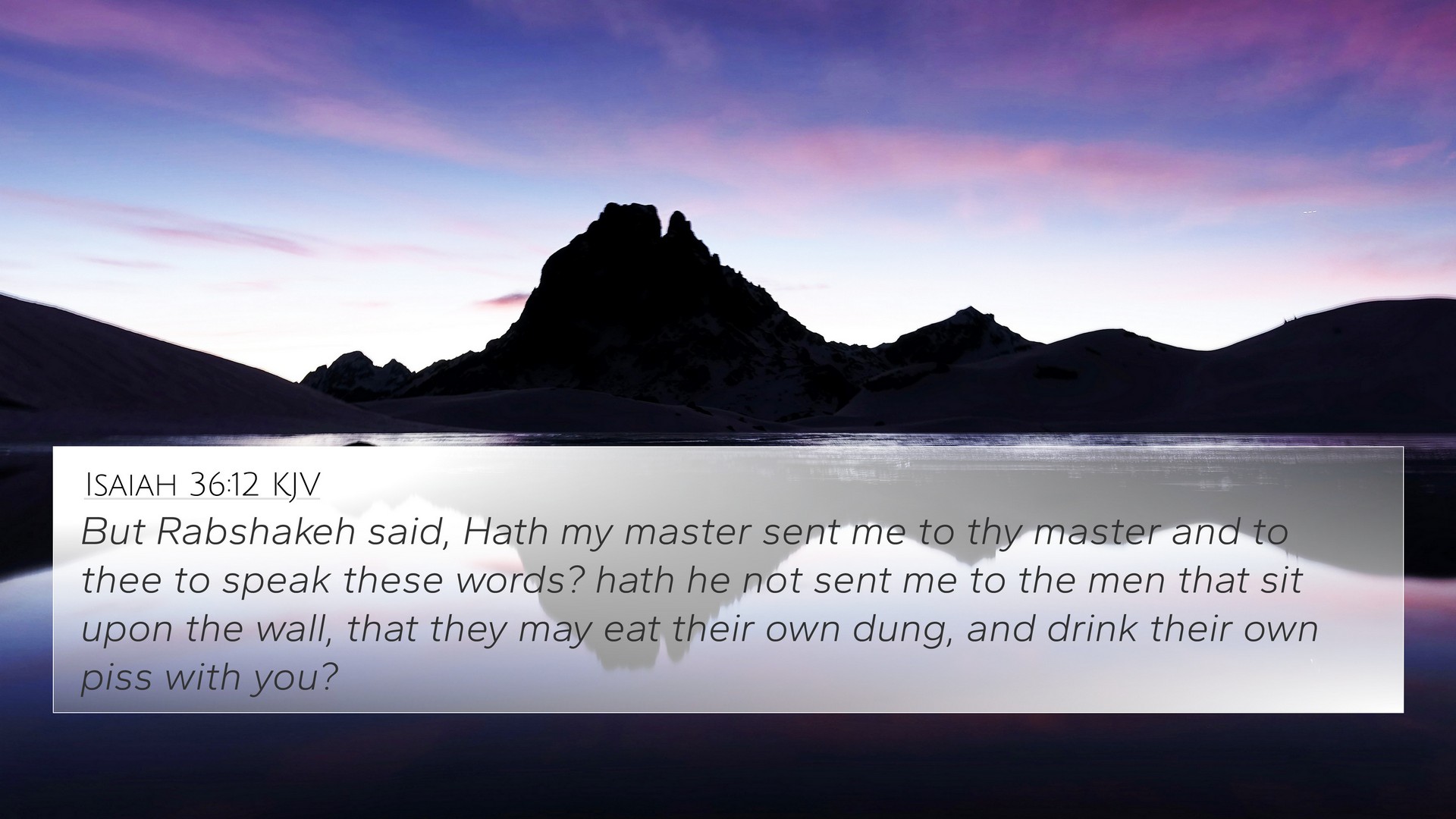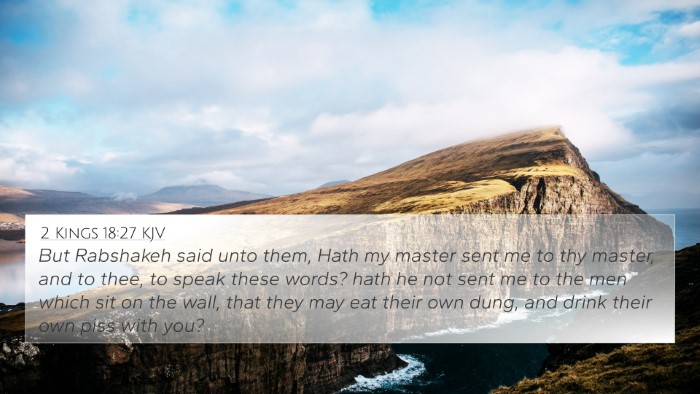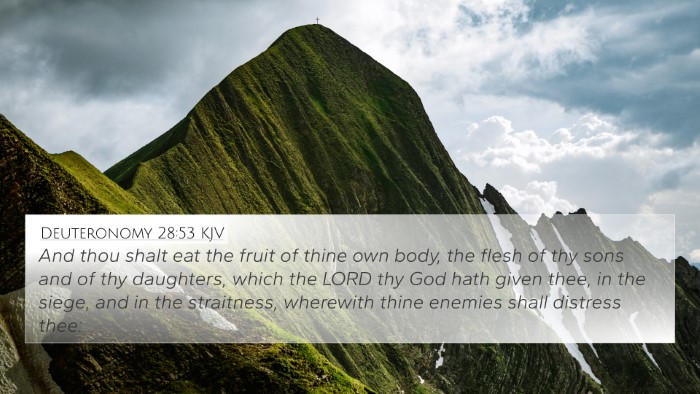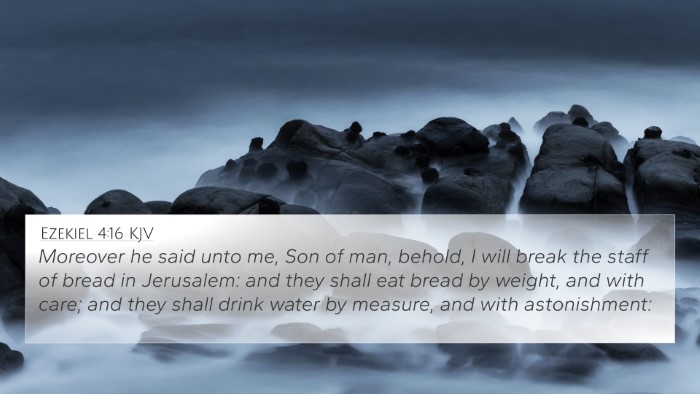Understanding Isaiah 36:12
Isaiah 36:12 provides a crucial insight into the dialogue during the Assyrian siege of Jerusalem. This verse highlights the Assyrian perspective and the psychological tactics used to demoralize the inhabitants of Jerusalem. The verse states:
"But Rabshakeh said, 'Has my master sent me to your master and to you to speak these words? And not to the men who sit on the wall, who are doomed with you to eat their own dung and drink their own urine?'" (Isaiah 36:12, ESV)
Commentary Summary
The verse can be unpacked as follows:
- Historical Context: The events around Isaiah 36 unfold during the reign of King Hezekiah, a time of great turmoil for the kingdom of Judah.
- Assyrian Threat: The Assyrians, represented by Rabshakeh here, aimed to intimidate Jerusalem's inhabitants, portraying them as powerless and destitute.
- Psychological Warfare: This verse portrays a strategy to instill fear and chaos among the besieged, emphasizing the dire consequences of resistance.
- Divine Sovereignty: Despite the threatening words, the overarching theme in Isaiah indicates God’s control over nations and events, offering hope to the faithful.
Insights from Commentators
Three influential public domain commentators provide rich insights into this complex verse:
- Matthew Henry: He notes that Rabshakeh’s words serve to mock and taunt the people of Jerusalem, highlighting their vulnerability. Henry points out that this direct challenge to God’s covenant should remind believers of God’s ability to deliver.
- Adam Clarke: Clarke emphasizes the brutal reality of siege warfare, where starvation can lead people to desperate measures. He interprets this as an overarching metaphor for spiritual deprivation and the importance of reliance on God.
- Albert Barnes: Barnes discusses the rhetorical nature of Rabshakeh’s speech, considering it an attempt to undermine the people’s morale by presenting an exaggerated picture of their suffering. He asserts it foreshadows how faith must stand firm against external discouragement.
Cross-References
To further understand Isaiah 36:12, consider these cross-references that illustrate similar themes or moments of despair followed by divine intervention:
- 2 Kings 18:27: This passage parallels Rabshakeh’s speech, showcasing the Assyrian strategy to intimidate Judah.
- Isaiah 37:3: A reference to the cry for help from Hezekiah, revealing access to divine assistance despite overwhelming odds.
- Psalms 22:14-15: A depiction of desperation that resonates with the suffering inhabitants of Jerusalem.
- Isaiah 1:20: An explicit challenge from God towards the people of Judah regarding obedience and their ultimate fate.
- Matthew 26:39: The plea of Jesus in Gethsemane mirrors the theme of facing dire circumstances with faith.
- Romans 8:31: Assurance of God’s support against formidable threats reinforces the promise of divine deliverance.
- Hebrews 13:6: This verse provides encouragement through the acknowledgment of God’s perpetual assistance.
Thematic Connections
The themes of despair, conflict, and reliance on God resonate throughout the Bible. Through comparative Bible verse analysis, we can identify and connect verses that provide perspective and encouragement to believers:
- Job 2:9-10: Experiences of suffering and the challenge of faith under trial.
- Philippians 4:6-7: A call to prayer amidst anxiety, demonstrating reliance on God.
- Revelation 21:4: Hope for a future free of suffering, contrasting the current state faced by God’s people.
Utilizing Cross-References for Deeper Understanding
When studying Isaiah 36:12, employing tools for Bible cross-referencing enhances comprehension and depth. Here are some methods:
- Bible Concordance: This tool helps identify key terms and their occurrences throughout scripture, revealing thematic ties.
- Cross-Reference Bible Study: Engaging with related verses can uncover layers of meaning within the Biblical text.
- Bible Reference Resources: Utilizing comprehensive materials such as cross-reference guides allows for more thorough comparative analysis.
Conclusion
In Isaiah 36:12, we see a moment of extreme tension that calls believers to reflect on their faith amidst trials. By understanding the historical context, utilizing cross-references, and recognizing thematic connections, we can grasp the fullness of God's plans even in dire circumstances. The scripture invites us not only to endure but also to maintain a profound faith that connects the old teachings with present-day experiences.










